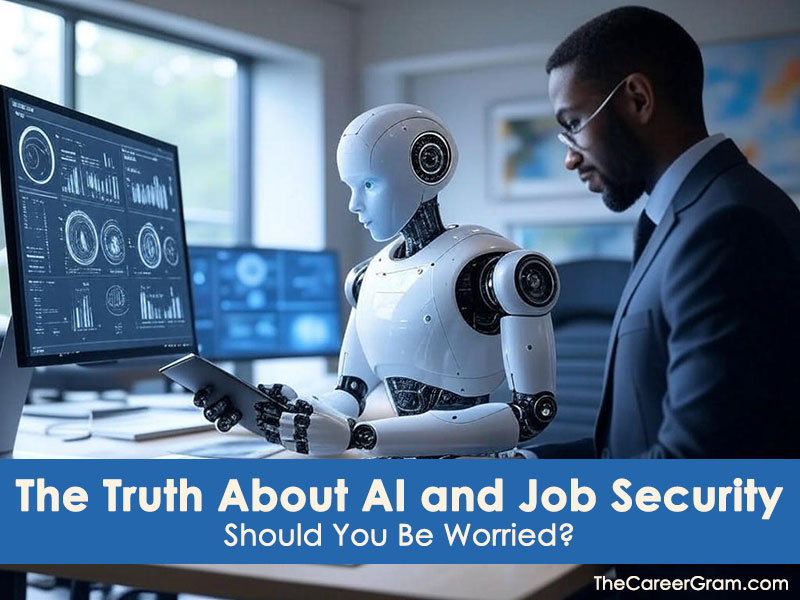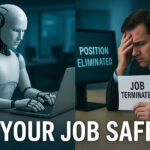Artificial Intelligence (AI) is no longer just a buzzword or futuristic concept; it’s already having a profound impact on industries worldwide. While AI offers incredible potential for innovation, automation, and productivity, it also raises concerns about its impact on job security. Will AI replace human workers, or is it merely transforming the job market? In this article, we explore the truth about AI and job security, providing insights into which jobs are most at risk, which will thrive, and how you can future-proof your career in an AI-driven world.

1. Understanding AI’s Impact on Jobs
AI’s impact on employment is a topic of much debate. On one hand, AI and automation can replace repetitive, manual tasks across sectors like manufacturing, customer service, and logistics. On the other hand, AI creates new opportunities for workers to innovate, enhance productivity, and perform higher-value tasks that require human creativity and emotional intelligence.
-
Job Displacement vs. Job Transformation: AI is more likely to transform jobs than to entirely replace them. Routine, low-skill jobs are at the highest risk of being automated, while roles that require complex decision-making, emotional intelligence, and creativity remain secure.
-
Why It’s Growing: AI is advancing at an unprecedented pace, with applications in healthcare, finance, retail, and even creative industries. As companies seek efficiencies, AI’s potential to automate tasks and make data-driven decisions is undeniable.
2. Jobs at Risk of Being Replaced by AI
While some industries will benefit from AI, others face the possibility of significant job displacement. These roles typically involve repetitive tasks that AI can easily perform.
-
Manufacturing Workers: Automation and robots can take over production lines and assembly tasks.
-
Customer Service Representatives: Chatbots and virtual assistants are already handling customer queries, reducing the need for human call center employees.
-
Truck Drivers and Delivery Workers: Self-driving trucks and drones are expected to disrupt the logistics and transportation industries.
-
Data Entry Clerks: AI-powered systems can handle data input and processing faster and more accurately than humans.
-
Retail Workers: With the rise of automated checkout systems and online shopping, the demand for in-store retail jobs is decreasing.
3. Jobs That Will Thrive in an AI-Driven Economy
While some jobs may be displaced, many others will thrive as AI technology evolves. These roles require human intelligence, creativity, and emotional insight—areas where AI currently falls short.
-
AI and Machine Learning Specialists: As demand for AI grows, the need for professionals who can design, implement, and maintain AI systems is skyrocketing.
-
Cybersecurity Experts: As AI automates more systems, the need for cybersecurity professionals to protect data and digital assets becomes more crucial than ever.
-
Healthcare Professionals: Doctors, nurses, and medical researchers will continue to be essential, with AI helping to augment their work rather than replace it.
-
Creative Professionals: Writers, designers, artists, and musicians will continue to create original content that requires emotional intelligence and cultural insight—something AI can’t replicate.
-
Human Resources Specialists: As AI takes over administrative tasks, HR professionals will be needed to manage human relations, culture, and employee engagement.
-
Educators and Trainers: AI tools can assist in teaching, but the role of human educators—especially in specialized fields—is irreplaceable.
4. The Skills You Need to Stay Relevant
While it’s true that AI will transform job markets, it’s not all doom and gloom. By acquiring new skills and adapting to the changing job landscape, workers can future-proof their careers.
-
Adapt to AI Tools: Familiarize yourself with AI-driven tools in your field. For example, data analytics tools, AI-driven marketing platforms, and automated customer service systems can boost your productivity and make you more competitive in the job market.
-
Develop Soft Skills: As AI can’t replace emotional intelligence, communication, creativity, and critical thinking, cultivating these soft skills will be invaluable.
-
Learn Tech Skills: Embrace the rise of automation by learning coding, data analysis, machine learning, and other technical skills. Many free or affordable online courses are available to help you develop these skills.
-
Lifelong Learning: The job market is changing rapidly, so keeping up with new developments and continuously learning will help you stay ahead.
5. How to Adapt to an AI-Powered Workforce
Adapting to an AI-powered workforce doesn’t require abandoning your job or profession but instead evolving alongside these technological advancements.
-
Embrace Collaboration with AI: Rather than fearing AI, learn how to collaborate with it. Many professionals are using AI to enhance their work, whether it’s leveraging AI for data analysis, marketing automation, or design.
-
Pursue AI Certifications: With the rise of AI-driven industries, professionals who can manage and leverage AI will be highly sought after. Pursuing certifications in AI, machine learning, and data science can position you as a leader in these fields.
-
Be Flexible: The future of work is dynamic. Being flexible and willing to shift gears or pivot to new roles as needed will help you stay competitive in a world where AI is part of the workforce.
6. Is Your Job Safe?
While AI is undeniably changing the job landscape, it’s not necessarily a cause for concern. Jobs that involve human connection, creativity, strategic decision-making, and problem-solving are less likely to be automated in the near future. AI is more of a tool to enhance human capabilities rather than a complete replacement for human workers.
-
Assess Your Role: To determine whether your job is at risk, consider if it involves repetitive tasks that AI can easily automate or if it requires human insight and creativity.
-
Invest in Education and Skills Development: Continue to invest in skills that complement AI technologies—learning to work alongside AI can actually make you more valuable to employers.
Conclusion: Embrace AI and Stay Ahead of the Curve
The truth about AI and job security is not as grim as it may first appear. While certain jobs will be automated, many others will thrive as AI continues to advance. The key to staying secure in an AI-driven world is to adapt, upskill, and embrace AI as a tool that can enhance your career. By focusing on roles that require human creativity, emotional intelligence, and decision-making, you can ensure that your job remains relevant and valuable, no matter how much technology evolves.
